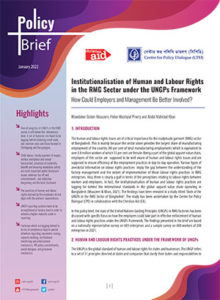 Institutionalisation of Human and Labour Rights in the RMG Sector under the UNGPs Framework
Institutionalisation of Human and Labour Rights in the RMG Sector under the UNGPs Framework
How Could Employers and Management Be Better Involved?
The human and labour rights issues are of critical importance for the readymade garment (RMG) sector of Bangladesh. This is mainly because the sector alone provides the largest share of manufacturing employment of the country (40 per cent of total manufacturing employment) which is equivalent to over 2.8 million workers of which 53 per cent are female. Being a part of the global apparel value chain, employers of this sector are supposed to be well aware of human and labour rights issues and are supposed to ensure efficiency of the employment practices in day-to-day operation. Various types of anecdotal information on labour rights practices imply the gap between the understanding of the factory management and the extent of implementation of these labour rights practices in RMG enterprises. Also, there is clearly a gulf in terms of the perceptions relating to labour rights between workers and employers. In fact, the institutionalisation of human and labour rights practices are lagging far behind the international standards in the global apparel value chain operating in Bangladesh (Moazzem & Khan, 2021). The findings have been revealed in a study titled ‘State of the UNGPs in the RMG Sector of Bangladesh’. The study has been undertaken by the Centre for Policy Dialogue (CPD) in collaboration with the Christian Aid (CA).
In this policy brief, the state of the United Nations Guiding Principles (UNGPs) in RMG factories has been discussed with specific focus on how the employers could take part in effective enforcement of human and labour rights practices under the UNGPs framework. The findings presented in the brief are based on a nationally representative survey on 603 enterprises and a sample survey on 600 workers of 200 enterprises in 2021.
Authors: Khondaker Golam Moazzem, Helen Mashiyat Preoty and Abdul Mahidud Khan
Publication period: January 2022


